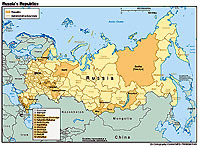All Politics Is Local: Rating Russia’s Regions

MOSCOW, November 6 (Dan Peleschuk, RIA Novosti) Economic progress, a clear political mandate, and good press: these are the things, according to a new report by a leading Russian think tank, that make a Russian region truly stable.
It was otherwise largely unnoticed regions, such as Mordovia, that fared best in the rating, despite other ostensibly more likely contenders and the considerable federal spending in the volatile North Caucasus aimed at bringing stability to the region.
Known for its annual survival ratings for Russian governors, the St. Petersburg Politics Fund, headed by political analyst Mikhail Vinogradov, drafted the report to supplement what Vinogradov called a lack of attention to Russia’s regions.
The Mordovia, Amur and Belgorod Regions took the top three spots, respectively. Their success was largely ascribed to efficient public officials, broad support for their elected representatives, and investment in local industry.
In Amur, for example, Governor Oleg Kozhemyako, who has lobbied the federal center for tax breaks for his region, commanded 77 percent of the vote in last month’s regional elections. Similar reasons lie behind Belgorod’s good performance, the study says.
The country’s three most volatile republics in the North Caucasus region – Dagestan, Ingushetia, and Chechnya – all fared the worst. They have seen a series of high-profile killings and suicide bombings in recent months perpetrated by the fundamentalist Islamic insurgency in the region.
The report pointed to Chechen Head Ramzan Kadyrov’s recent BBC interview, in which the leader jokingly downplayed rumors of a “death list,” as negative publicity that helps weigh down Chechnya’s rating.
Recent instructions by Dagestan’s President Magomedsalam Magodemov to create vigilante “self-defense units” to counter the Islamist threat in the region, also did nothing to help boost Dagestan’s ratings, the report found.
The study considered political, economic and social developments in September and October while compiling the rankings.
Vinogradov told RIA Novosti on Tuesday that because the rankings are based on contemporary political and social dynamics, they may fluctuate particularly, he added, the top three spots.
